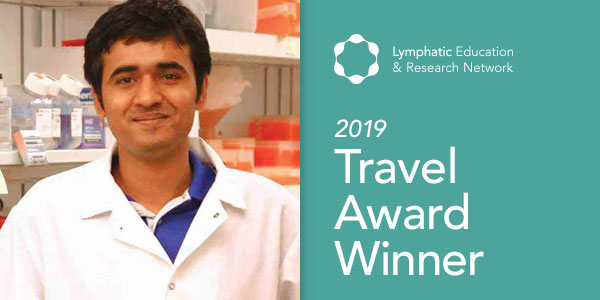Riaj Mahamud, currently completing a Ph.D. at the University of Oklahoma HSC, under the supervision of Dr. Sathish Srinivasan, received a Travel Award from LE&RN to attend the 2019 Lymphatic Forum in Austin, Texas. Mr. Mahamud contributed this blog post for LE&RN about his experience at the Lymphatic Forum and about his research.
I am really happy and glad that I had the opportunity to attend the Lymphatic Forum in Austin, Texas. I would like to express my gratitude to LE&RN for the travel award. Before attending the conference, I had no idea about the sufferings of lymphedema and lipedema patients. During the conference, we all had the chance to hear about the lymphedema and lipedema patient’s experience from themselves.
It is appalling to know the distress and suffering these patients go through every day. Most of these patients have limited to no daily activities, and are often bedridden. But researchers have great strides in first recognizing these diseases across the USA. Now, we have a better understanding of the nature and effects of these diseases. Recent work from the different labs has identified several genetic mutations and parasites associated with lymphedema. Many more labs are also working on figuring out the mechanism of disease development. The scientific community is striving hard to figure out the cure for these diseases. There are a variety of reasons for these diseases so it is not easy to target one pathway or molecule to cure the diseases. But with an increase in funding and continual research, it is not far away to figure out the cure for these life-debilitating diseases.
1. What did you get out of the Lymphatic Forum? Why did you feel it was important to attend?
Attending the Lymphatic Forum, I got to know more about the patient’s perspective in lymphedema and lipedema. Now, I have a better idea about what we are fighting for in the lab. Attending the conference also helps keep researchers updated about the current research on lymphatic disease. It creates a platform where we meet and discuss our work with peers and quite often leads to successful collaborations.
2. What are your areas of interest in research?
I am a basic science researcher working in lymphatic vasculature development using a mouse model. Mutations in a gene called GATA2 develop lymphedema in Emberger syndrome patients. I have found that the lymphedema associated transcription factor GATA2 regulates miR-126 during lymphatic vasculature development. We found that GATA2 binds to the miR-126 promoter and regulates its expression and miR-126 in turn required for proper lymphatic capillaries development, lymphatic valve, and lymphovenous valve morphogenesis.
3. What are your hopes and plans for your career and your research?
I hope my research will figure out some target(s) that we can manipulate in Emberger syndrome patients. We are interested in the possibility that miR-126 might one day be used as a drug to treat lymphedema in Emberger syndrome patients. I am planning to continue my lymphatic research so that I can contribute back to society.
4. Why do you believe that, in general, lymphatic research is important? What might the field accomplish within the next few years?
I believe lymphatic research is very important as millions of people not only in the USA but also around the world are suffering from these diseases. I believe within the next few years lymphatic research will significantly improve the quality of life of these patients.
LE&RN programs, like LE&RN Travel Awards, are only possible because of our Partners and Supporting Members. Become a Supporting Member today.

